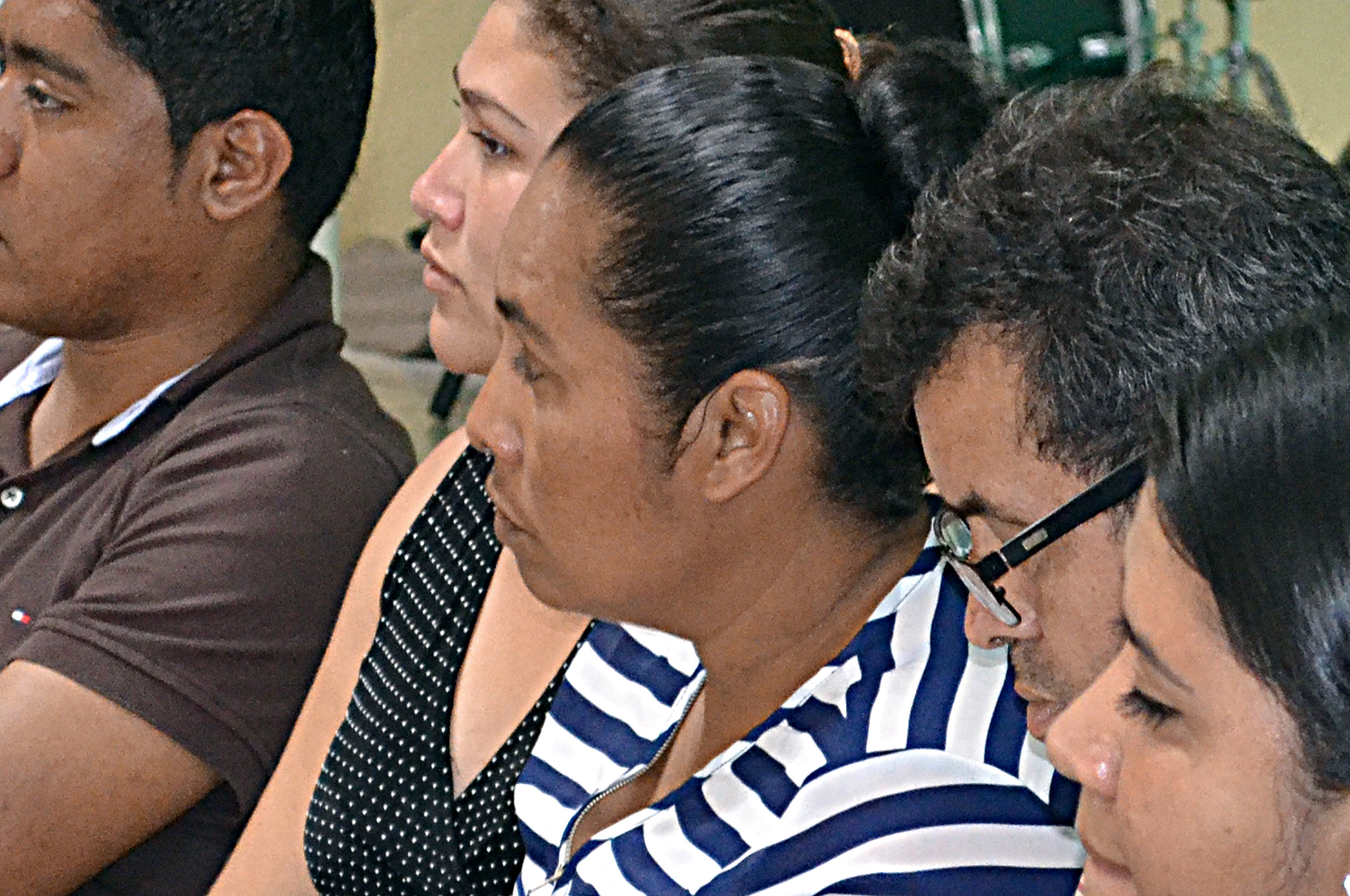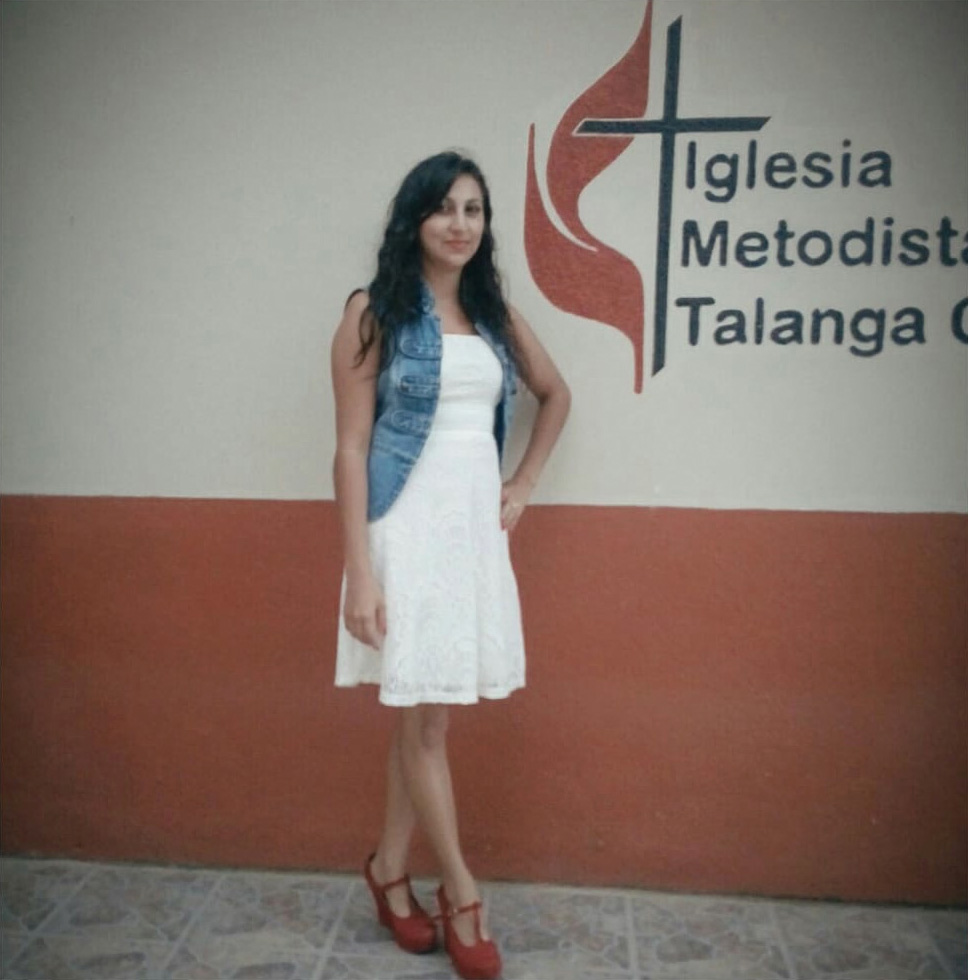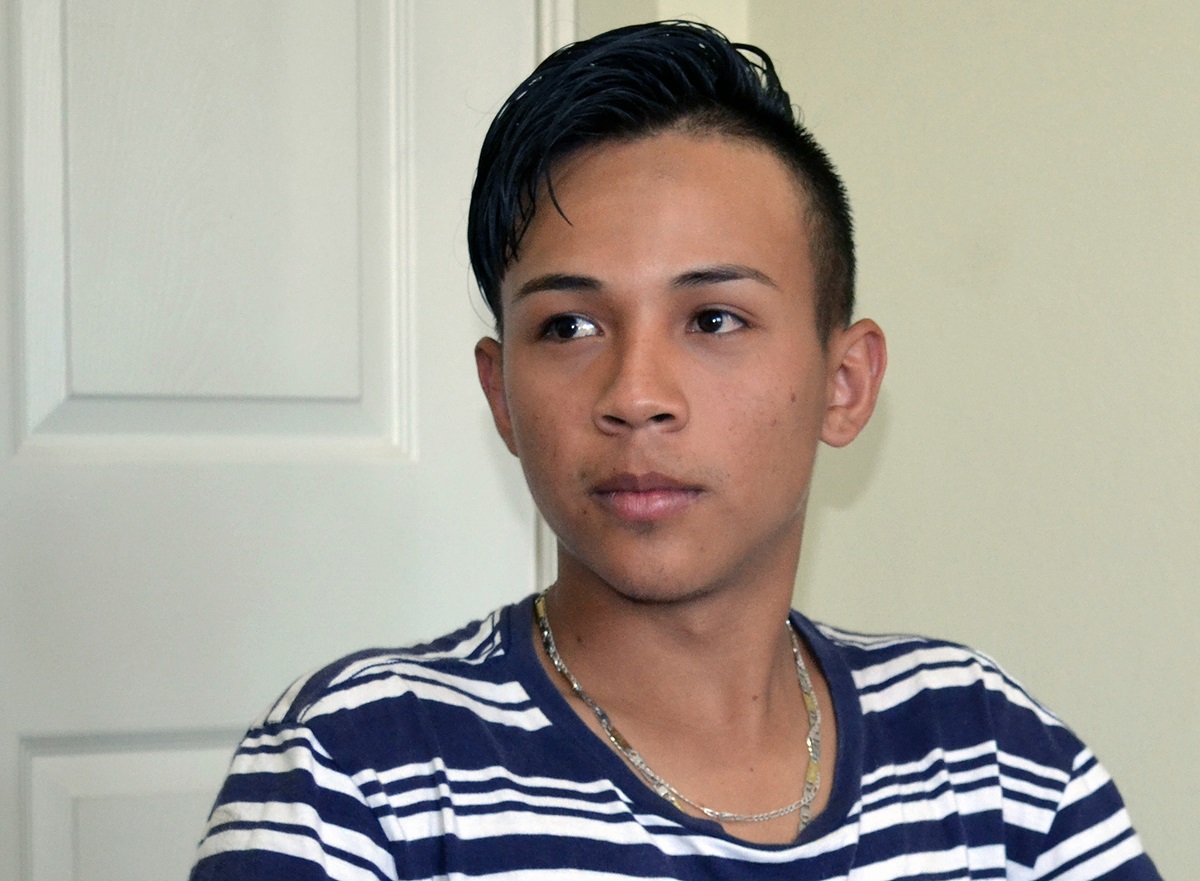“Staying might kill you, but leaving might also.”
That sentiment is expressed by many Hondurans, including United Methodist families, who agonize daily about that choice. They can stay amid social violence and struggles to earn a living or embark on a dangerous, three-month journey crossing the Guatemalan, Mexican and United States borders.
The Honduran Migration and Consular Observatory reports that nearly 47,000 Honduran migrants — an average of 128 daily — were deported from the United States and Mexico in 2017. Almost 35 percent were women and 5 percent were children.
“It is a matter of life or death,” said Fernando Rodríguez, 18, who plays various instruments for a United Methodist church band in Tegucigalpa.
He started his journey toward North America in mid-April 2018. “It was hard when my parents took me to the bus station,” Fernando recalled. “I saw them crying. They did not want me to leave. I told them, ‘Trust God because God goes with me. He sustains me.’”
Arely Rodríguez, Fernando’s mother, remembered her son telling her on a Wednesday that he was going to leave on Saturday to reach his “American Dream.”
“He was not going to tell me. Many people leave without any warning,” she said. “I had already heard all about what happens on the way up. . . . I could not do anything but support him,” added Arely, a lay leader at her church.
Leaving his country and quitting school a month before the academic year ended were decisions that Fernando, the older of two children, and his family made in order to keep him alive.
Maras, an international drug gang, had approached Fernando. Maras, otherwise known as “Mara Salvatrucha” or “MS-13,” is an international gang that emerged in the western United States in the 1980s and expanded to Central America.
“They wanted me to sell drugs and give me a gun,” Fernando said. He rejected them, but the threats against his life pushed him to accept the drugs for sale.
“He could not sell drugs,” Arely said, “because he considered it wrong. Instead, he threw them, gave his lunch money to them and starved until he returned home.” She and her husband found out what happened when they noticed Fernando was losing weight. At that point, the family moved, but Maras reached Fernando in the next place.
Why not go to the police, one might wonder?
“Truthfully, we have more fear of the police than a Mara member,” Fernando said.

With 3,000 Lempiras ($125 U.S.) in his pocket, Fernando and two friends departed on the same bus. He bought bus tickets to Guatemala and then Mexico. “I walked for eight days straight with a partner,” he said. “I ran into Salvadorans and other Hondurans. We shared food, and when we did not have any, we starved. I saw mothers with little children and pregnant women. Everyone goes with a common purpose: to support their families.”
Fernando longs to study English and work. He is willing to settle anywhere in the U.S., but he is aware of the country’s resistance toward newcomers. He knows the current government and some people in the U.S. either dislike immigrants or prefer they arrive through legal venues.
But legal channels are financially out of reach, Fernando said. “Going to the embassy for a visa will require money I don’t have, paperwork I will not be able to support and family members in the United States.”
In Mexico, Fernando and his friends cleared land, herded and milked cattle and hunted snakes on a ranch. “We got 100 pesos ($5) a day,” he said. “I was determined to survive.” One of his friends let him call his mom once a week for 10 minutes.
Arely wept as she heard her son’s voice. “I could not sleep. My husband could not eat,” she recalled. Fernando and his mother agreed that a migrant’s loved ones who stay behind suffer the most. “My God, help me to arrive in the U.S. so I can help my parents and my sister,” Fernando prayed.
On five occasions throughout the journey, they sheltered at La Casa del Migrante, Roman Catholic houses where 20 to 25 migrants can spend up to two nights and eat, shower, change clothes and recover to resume their journey. Nuns and other staff pray with them and provide maps and encouragement. “If you feel strong, continue walking with God, but if you feel you can no longer continue, call migration authorities and they will take you,” Fernando remembered the nuns saying.
One night, Fernando and his friends arrived late at the migrant house. They had to sleep on the train tracks. Eight people assaulted them. “They beat one of my friends and threatened to kill him,” Fernando said. “I told them to take everything but not to hurt us.” Without shoes, identification or money and with little clothing, Fernando decided to earn enough money to return home. One of his friends stayed and filed paperwork for a permit that would allow him to be in Mexico for six months.
“I came back to Tegucigalpa on May 26,” Fernando said. “My mother had no idea I was returning, but I called her once I arrived and asked her to please pick me up at the bus station. She was very happy, just like my dad and little sister who told me how much she loved me.”
His mother said it was devastating to learn her son had slept on benches or on the floor.
“I lived out that suffering, but I do not wish it on anyone. I want to work with people who are thinking about leaving or returning to teach about the dangers they will encounter. Many come back amputated and with traumas that are invisible but present internally. I want to serve in that capacity, and I pray God leads me to be who he wants me to be,” she said. She was referring to life-altering injuries some migrants have incurred on Mexican freight trains.
Miriam Valerio attends Iglesia Metodista Unida de la Jagua in Danli, another church of the United Methodist Mission of Honduras. Nine years ago, she thought God had forgotten her and her two children. Her husband, Oscar Pavón, spent three and half years in the U.S., sending the money he had promised to keep their children healthy and in school.
“He left all of a sudden,” Miriam said, “but I supported him. I started saving the little he sent us, but as he left here, he also forgot about us.”
In 2009, Miriam stopped receiving the $100 Oscar had sent every two weeks. Miriam and their children called Oscar many times, but he stopped answering. She fell into a deep depression about how to support her children alone as Oscar was slowly consumed by alcohol addiction.
After 12 years in the U.S., Oscar was deported. He returned to Honduras with very little in his hands and big expectations of his family. “He was looking for his children and wife, but he found neither,” Miriam said. “We had to move on without him.” Oscar never saw the level of heartbreak his family experienced. Their children, now 20 and 22, are pursuing law-enforcement careers.
Miriam started attending a United Methodist church and began recovering. “I listened to my pastor preach and the congregation living out the faith,” she said, “by helping me feel supported and a member of a caring community. My sister let me live with her, and I realized my children were my motivation.”
She baked bread and sewed clothing to sell. With the sale of her father’s house in addition to the money she saved from her businesses, Miriam and her children bought a house for themselves.

In 2006, Kelyn Zuniga, from Talanga, met Eduardo, her future husband and the father of her three children, now 4, 7 and 11. Eduardo worked with her at Russell Corporation, a U.S.-based textile company that made shirts and socks. “The pieces that had defects were left in Honduras,” Kelyn said, “and then sold at a higher price.” The items that passed inspection were sent to the U.S. The couple’s combined weekly income was $90 for 12 hours of work a day.
Choloma, Honduras’ third-largest city, “became very violent,” Kelyn continues, “since Maras were taking over. We used to get paid through an ATM. We withdrew the money near the bus station. That spot became a target of assault. We decided to returned to our town, Talanga, because we preferred peace.”
When they had their first child, Eduardo and Kelyn worked alternate job shifts. “Unfortunately, we were not able to see each other very often, and that created some problems,” Kelyn said. For seven years, Eduardo worked for a sawdust company. He made $6 a day from the hard labor. Workers were buried in sawdust avalanches. “Additionally, when it rained, there was no way to work at all,” she said.
Kelyn aspired to study accounting and, eventually, to teach. However, once she had a second child, that dream disappeared. “I enjoy working with youth and young people,” she said. “I can pass my knowledge to others.” She has little motivation to pursue a professional career in Honduras, where jobs are scarce.
“Only people who have connections with the government — if you are a cousin, son or friend of an important person — then you can find a dignifying job. That is why people prefer to leave to the United States, even if it means washing dishes.”
Eduardo decided to migrate to the U.S. He left for the first time in 2014 with $100. Eduardo arrived in Mexico and was caught and deported right away. He tried once more without success a year later, and finally arrived in Denver in 2016. He works in the roofing business. “It took him three months to get there,” said Kelyn. “Twenty-one days he spent in the desert and called me from Arizona to let me know he was safe.”
Eduardo left because he wanted to provide a better future for his family, particularly education and a house. Although he sends money home weekly, Kelyn said Eduardo changes his mind often about the future.
“He does not know what could be better: coming back to Honduras or sending for us to go there,” she said. “He is very concerned about the violent environment.” They still hope to save enough money to buy land in Honduras – around 200,000 Lempiras ($8,300 U.S.) – on which to build a house.
Eduardo communicates with the rest of the family once or twice a day. “It is so difficult feeling alone and so far from one another,” Kelyn asserted. “The first three months, I cried a lot for him. Our children got bad grades at school, too. Little by little, we recovered and adjusted.
“Now we have food, education and other things that before we lacked. We are not in an ideal situation, but I feel we are getting in a steady place. We are going to continue fighting to be together at some point, here or there. God is present with us.”
The family attended a Presbyterian church, but it closed. “When Central United Methodist Church arrived,” Kelyn said, “I felt peace. The congregation embraced us. They did speak with my husband trying to convince him to stay, but he had made up his mind. He felt powerless not being able to provide for his family. The church understood my situation.” The church supported her spiritually and financially, even providing a scholarship for one of the children.
Writing for the United Methodist Board of Global Ministries, Daniel Alberto Trujillo described the United Methodist presence in Honduras as “the church on the other corner.”
“While most churches position themselves in the center,” he said, “this church has moved from the center to the periphery to a corner. It … is strong, prophetic, symbolic, political and social, yet invisible.”
Trujillo said that for 15 years, the United Methodist mission has reflected wholeness, salvation and a mission on behalf of the poor and marginalized people.
“In the corners of life, God is revealed to [people] living in a marginalized social situation. In part, this is why the church is invisible; it serves invisible people. These vulnerable groups have been – and will continue to be – the focus of development for the United Methodist Mission in Honduras.”
Carlos S. Reyes Rodríguez is a United Methodist communicator in Honduras. News media contact: The Rev. Gustavo Vasquez, director of United Methodist News Service for the Hispanic/Latino community. Contact him at (615) 742-5111 or gvasquez@umcom.org. To read more United Methodist news, subscribe to the free Daily or Weekly Digests.
Like what you're reading? Support the ministry of UM News! Your support ensures the latest denominational news, dynamic stories and informative articles will continue to connect our global community. Make a tax-deductible donation at ResourceUMC.org/GiveUMCom.


